I had the enormous privilege of giving the eulogy at Carol’s funeral this week. It was followed by a personal reflection, given by Chris Sadler.
Chris and I had the difficult task of visiting several people living in large institutions in 1989, and deciding whether they would be the right people to move into Gothic Lodge, our almost-ready new L’Arche Community home for six people with severe and profound learning disabilities.
At the time I thought we chose Carol. Now, I think she chose us.
For those of you who have been asking: Here are our words in full.
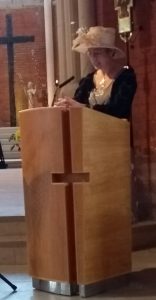
Eulogy for Carol Bell, given by Irene Tuffrey-Wijne
Carol Ann Bell.
Look at all these people here, gathered to mourn your life, and celebrate your life, and laugh and cry about your life, because you touched theirs. Look at the many people all over the world, who wanted to be here, but couldn’t make it. Look at all these hats!
Carol’s birthday, hugely anticipated and celebrated every year, was on 1st December 1950.
She was the second of seven children.
And she was loved. Carol’s mother loved babies, and she loved Carol.
But to be a child with disabilities in the 1950s was hard, and to be the family of a child with disabilities was also unbearably hard.
In those days, babies and young children with disabilities were put away in large institutions. Families were told that it was best for the child to be “with her own kind”, and it was best if their families forgot about them and never visited again, because family visits – and especially family departures – were just too upsetting.
Carol’s mum didn’t want to give Carol up.
But in the end she had to, because there was no support, and she was struggling to cope, carrying this toddler up the stairs, with an older child and another baby on the way. Carol went into a large institution at the age of two. And she lived there until she was 39.
We know very little about these years. Records were lost. Much of Carol’s life was lost.
But we do know that her mother defied the establishment’s advice. She visited Carol for years, taking the long, long walk to the hospital, sometimes taking one of her other children along.
In a way, Carol’s mum never gave Carol up.
We know now that those hospitals were dreadful places to live. Years later, Carol’s mum and one of her siblings who remembers this, told me that they were also dreadful places to visit. That they managed it at all is amazing, because most families didn’t. But in the end, it simply was too hard and too upsetting, not just for Carol but also for her mum. She stopped visiting when Carol was about 20 years old.
But she held Carol in her heart, always.
Chris Sadler and I first met Carol when she lived in St Ebba’s hospital in Epsom.
At some point, St Ebba’s had over 600 beds for “mentally subnormal patients”. The hospital was finally closing, with residents moving into small homes in the community.
We walked into the large lino-floored room with about a dozen women in it, and she watched us like a hawk. Who would we go to? She knew that if strangers came onto that ward, they usually came to meet a fellow resident, and that resident would soon move out. She was completely delighted that we came to see HER. It was her lucky day.
Of course we all know, now, that it was really OUR lucky day. We were so lucky to have found Carol.
That day, Carol showed us around the hospital grounds. The first thing she did was to drag us to another ward, to introduce us to “My Friend”. This was a man in a wheelchair, who was unable to talk. It was clear, even then, that Carol had a gift for friendship, as well as a gift for community. She wanted us newcomers to know her friends. She must have had many friends in that hospital.
Carol moved into Gothic Lodge in 1989. It was a drastic new beginning.
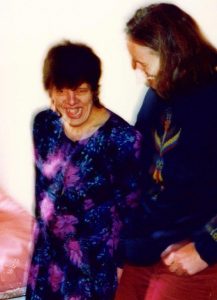
Carol’s first day in Gothic Lodge, 1989 (with Chris)
Sadly, her old friendships were lost. We were unable to keep track of her friends. All she had with her was a dustbin liner with a set of brand new clothes, and memories she was unable to tell us about. 39 years of her life were erased and lost.
We think her memories were, and remained, vivid. We had glimpses.
Carol was a great observer, and a compassionate observer. We think she must have honed those skills in the hospital, where she saw many people in need, and indeed people dying. In later years, she would sometimes show us this by acting it out.
Philip, Chris and myself had just moved into Gothic Lodge. So had Sunta, Betty, and several others. Laurence and Terry arrived over the next few weeks.
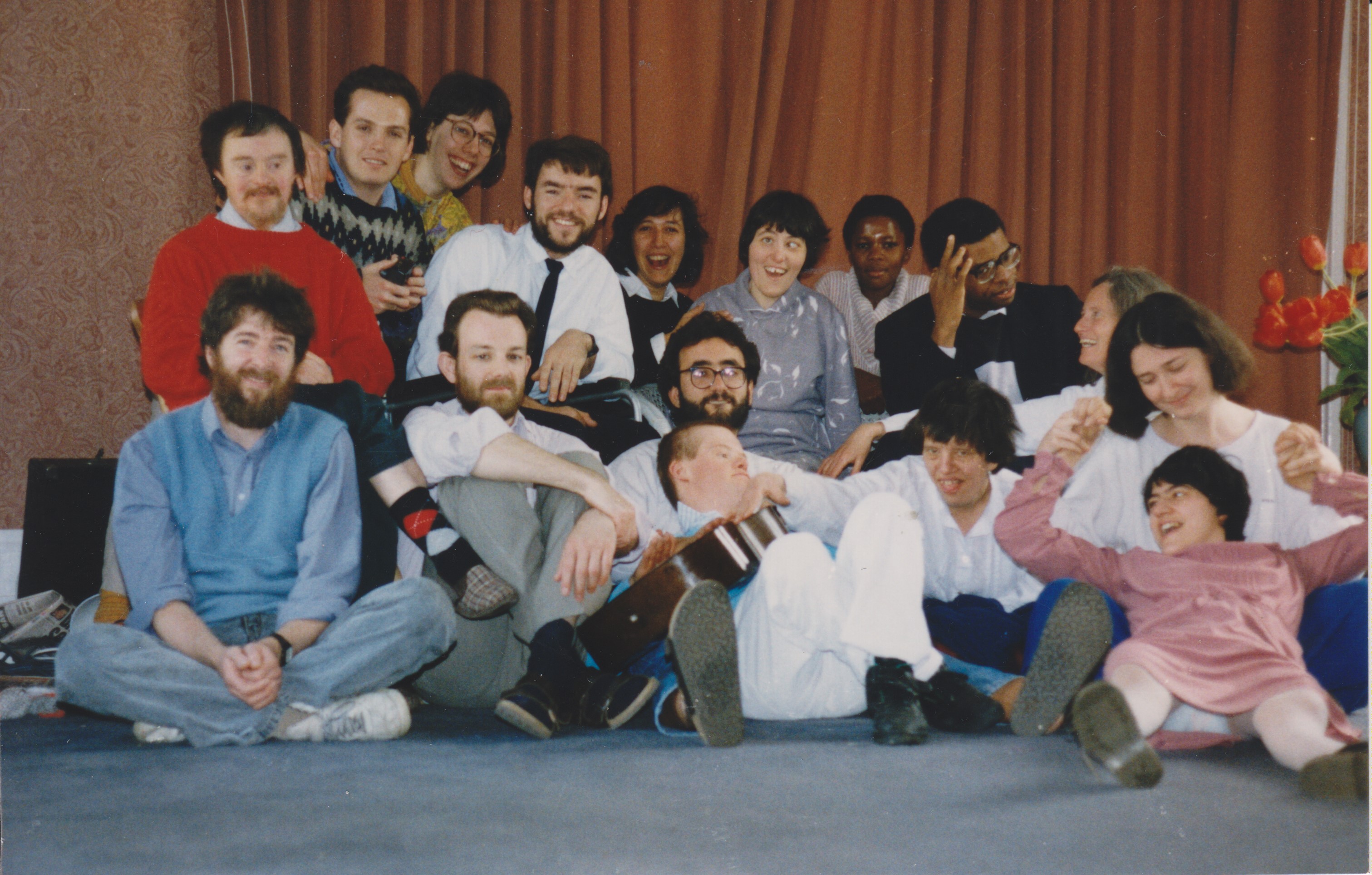
The Gothic Lodge household in 1990 (Carol in front, 3rd right)
We told Carol that Gothic Lodge was her home. And so it turned out to be. Over the years, she became the centre of gravity in her home. She became the home maker, the welcomer.
And to Carol’s great joy, and that of her mother, contact with her mum was re-established after a 20 year gap.
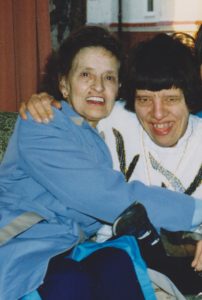
Carol and her mother in 1990, reunited after 20 years
Many of us feel guilty or regretful about having had Carol in our lives, but not being in contact much. But Carol never held a grudge. She didn’t look at the years she hadn’t seen you. She was simply utterly delighted to see you now, as if you’d never been away.
To her equally great joy, years later she also found her siblings again, when they all met up at their mother’s funeral. Carol loved going to stay with Jim and Marie in Kent, with Dave in Blackpool (who sadly died last year). She loved her nieces, and their children. Young Robson who loved getting her shoes for her, and helping her put on her coat, and holding her hand when they went out.
It is amazing that despite the years of forced separation, Carol was, in her family’s words, “a true Bell”. I’m told that once the Bells make their minds up, that is it!
Carol shared her mother’s love of babies. She shared the Bell sense of humour, their love of animals, and of horror movies, and of Kung Fu Fighting.
It was a joy to welcome Carol, but it wasn’t always easy in the early years in Gothic Lodge.
It took a long, long time for Carol to believe that this was her true home, with friends who loved her. She would spend night after night curled up asleep on the floor outside Chris’ bedroom, perhaps making sure that we stayed in her life. Whenever Chris went away for a few days, Carol would go into Chris’ bedroom, just to check that all her things were still there and Chris hadn’t disappeared.
“You come back!” is an instruction many of us have ringing in our ears.
In the 29 years Carol lived in Gothic Lodge, she welcomed hundreds of new people into her home and her life.
Some for a few months, some for a few years. Many became lifelong friends. The visitors she welcomed cannot be counted, but I’m pretty sure they all remember her.
How are you? she’d ask. What’s your name?
She wanted to know not just how you were, but who you were, and how you fitted into the fabric of life.
How’s your mum? How’s your dog? she would remember to ask.
Carol noticed people being unsure, or alone, or new to the group.
She would go to them and make sure they became part of things. And when people were unwell or sad, she knew it before anyone else, and she reached out to them, and worried about them.
I’m grateful to Pauline for letting me tell her story, because it illustrates so powerfully this beautiful gift of shared humanity that Carol had.
Pauline lived in Gothic Lodge in the early years, and remembers the time when she had a serious breakdown. Pauline was upstairs in her bedroom, lying on a mattress on the floor, very unwell. Nobody knew what to do. People came into the room with offers of talk, of food. None of it was any good.
Carol came in, sat on the end of the bed, and turned the telly on. And sat. Sometimes she’d look around at Pauline and nod at her. That’s all.
Carol was the one person who could sit with you. She saw your need.
And it wasn’t limited to people… There’s the story of the chicken being prepared for Sunday lunch. Carol looked at it and said, “Poor chicken! Not well!”
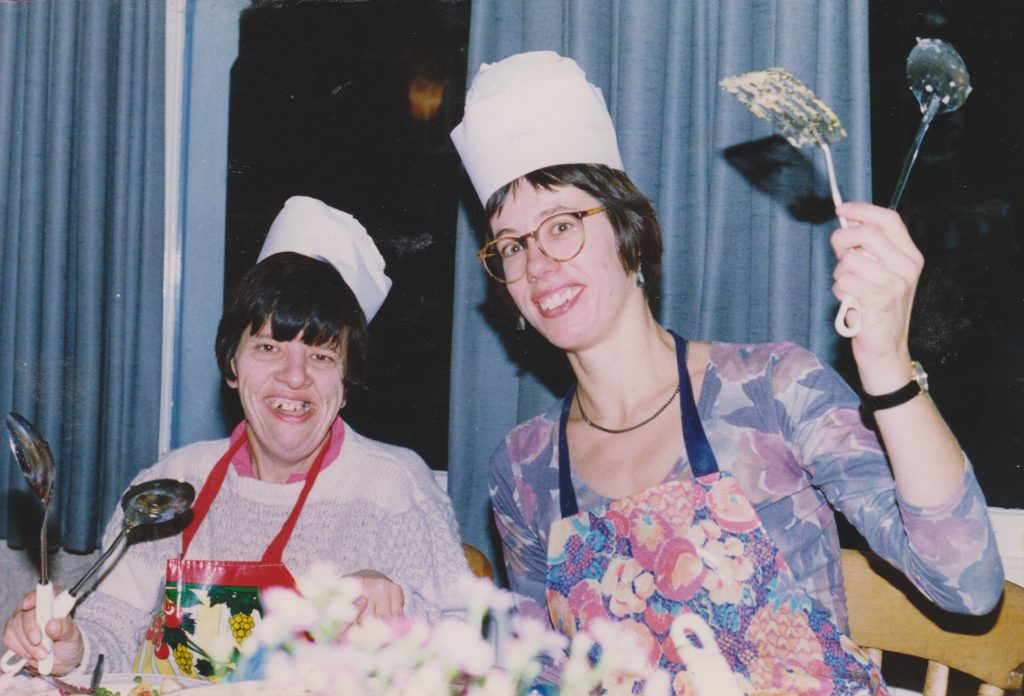
Carol’s joys in life were simple, easy to achieve, easy to share.
Watching and re-watching her favourite film for the 100th time. Any suggestion of a different film this time, would be very firmly declined.
Watching Casualty with Terry on a Saturday night. Regular trips to the local café. Cappucino. Sausages. Chips. Ice cream. Maltesers. Her love of the seaside and the cinema. Of music, singing songs. Of dogs and horses. Of babies and children. Of soft toys, the bigger the better. Her love of hats.
Her love of pilgrimage, belting out songs at the top of her voice whilst walking down the country lanes to Canterbury.
The care she took making everyone tea. Taking orders, boiling the kettle, laying the tray. The mugs would be over-filled, some would have 2 teabags in, the water off the boil, but it was done with such time and care and attention, making sure everyone had a suitable mug.
Her love of parties. Especially birthday parties. Especially her own on the 1st of December. By me, was all her friends needed to hear to know they were invited, quite possibly as early as August.
How she could say No more! with such cheer and good humour, yet so firmly.
And Carol was funny, often hilariously so.
It wasn’t just in L’Arche that Carol built community. She was also a faithful member of this church, the community of All Saints.
Here, even the parishioners who didn’t know Carol, know Carol, because of the way she made herself completely and comfortably at home in this church. Installing herself in the front row. Striding up and down the aisle, shaking everybody’s hand. Bringing up the offertory and kissing the priest at the end of it.
And of course: her very loud A-men!
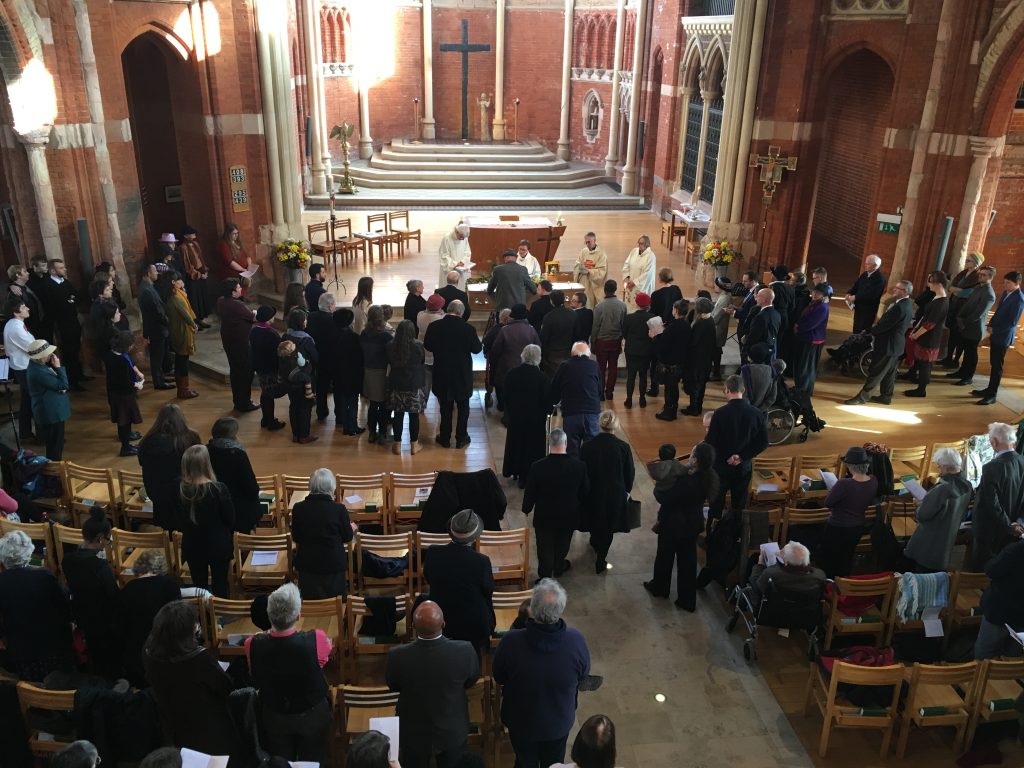
Carol lived a life of endurance and determination. Whatever the difficulties and the losses, she never gave up.
And Carol’s life, in the end, had come full circle. She had found her family, which is perhaps all she ever yearned for. She finally understood her place in the world, and she was at peace with her place. What a joy when her family managed to get to her 68th birthday party, just two months ago.
In the lost years of her life, Carol honed her skills of compassion and bloody-mindedness.
In the community years of her life, Carol honed the skills of friendship and of welcome. She was a community builder. Perhaps it was Carol’s mission to befriend people, including generations of young people. To teach them about acceptance and about loyal friendship, and then send them out into the world, changed by it.
Carol had a strong need to belong, and in searching to belong, she drew us in and helped us to belong too.
We will miss her more than we can say.
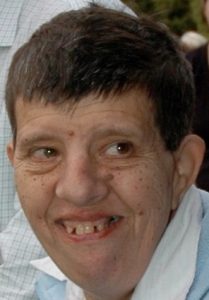
Carol died with a song and a prayer, surrounded by a community of friends.
That is a comfort to us. For many people here, it is also a comfort to think of Carol in heaven. Her delight in seeing so many friends there, and of course her mum and her brother David. It is a comfort to think that just 38 hours after her own arrival, she was first in line to welcome Michelle.
And it is a comfort to imagine how, when our time comes, Carol will have forced herself to the front of the crowd to reach out and welcome us. She will name us, and she will say, THERE you are!
She will probably drag us right into the centre of Heaven, and introduce us to everyone, just to make absolutely sure (once more) that we, too, belong, and like her, we, too, have found home.
(Irene Tuffrey-Wijne)
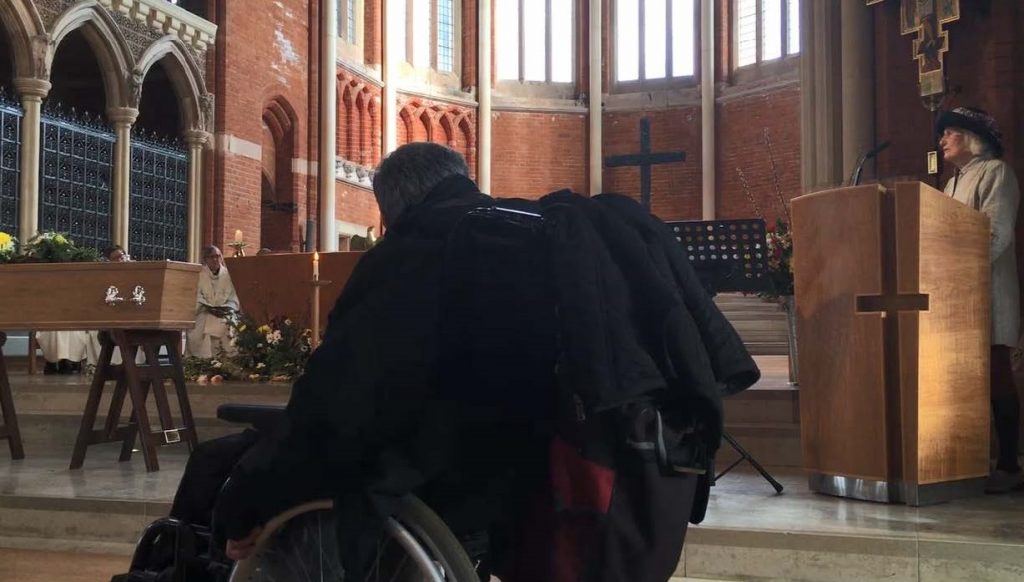
Personal reflection on Carol Bell’s life and friendship, given by Chris Sadler
I guess many of us here can say Carol was my friend.
Some of us who knew her well can say, and she was my teacher.
This is a personal witness to her friendship and teaching.
After Irene and I visited Carol in St Ebba’s Hospital, there were more delays to the renovations of Gothic Lodge. One day a call from St Ebba’s Hospital. Carol would not stop talking about going to a new home, hundreds of times every day, for months. When could she come, they pleaded?
Finally she arrived. I think we imagined welcome would be easy. After all, she wanted to come.
We did not remember what a shock it can be to arrive in L’Arche. So many new people, so many strange ways. She was not in control. I think it awakened her vulnerability, her deepest needs.
In her confusion, Carol glued herself to me, and stuck for years. As an extreme introvert it was not really my idea of friendship. I cringe remembering the countless times I said, Stop it. Leave me alone. I’ve told you.
I did not understand much about attachment theory then. It took time to realise I hated the clamour of her incessant needs partly because, unlike her, I had no idea what I myself really needed, let alone how to ask. Then a wise person said to me, When someone keeps repeating the same thing over and over again, it is not because they have not heard your reply. It might be because you have not heard what they are really asking or needing.
What if Carol was asking:
Do you really care? Enough to love me? Enough to let me be a faithful friend to you? To be with you when the chips are down?
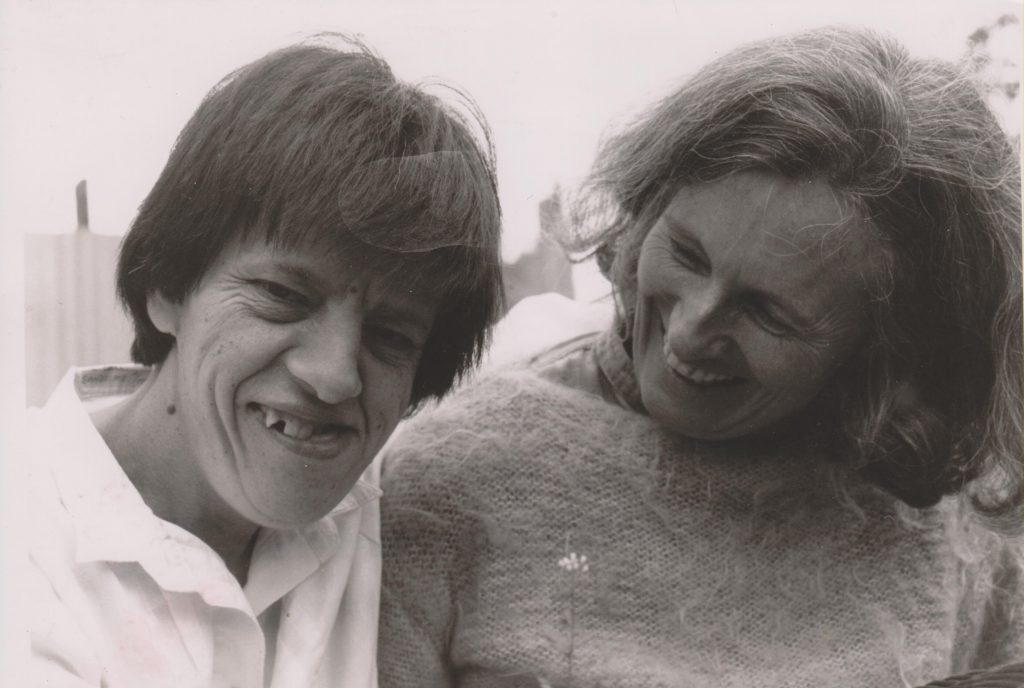
Carol and Chris in the early days
Carol brought some order into her strange new life, by importing old routines from St Ebba’s.
At night she folded her clothes impeccably ready for the next day. In the morning she made her bed before breakfast. We glimpsed other routines of institutional life. If she considered someone had misbehaved, she would mimic, Ignore him. No party for you.
In another life she could have been a very bossy teacher, a control freak, Lady of the Manor, or a Kung Fu fighter. But other qualities were emerging.
She was curious. She observed deeply. She read our faces, saw our hurts, felt our feelings.
She gave us our own unique names. Sometimes she tried one of us on like a costume: it was her gift of empathy. At other times when she mimicked someone with amazing accuracy, it was pure fun and she knew it.
But when she held a baby in her arms she had a timeless gaze.
Was there anyone who lived in Gothic Lodge or worked with her, that Carol forgot? I doubt it. If a connection was made it was for life, and it included all of us, all our failures of attention or kindness, even our leaving.
She forgave all.
Carol was not timid, always ready for an adventure: her first plane, her first pilgrimage, new beds, and new people were always exciting. True, years later, being unsteady on her feet was scary. Would she be upset or feel diminished at using a wheelchair? Just the opposite: she was liberated. She could give all her attention to life around her. She was empowered: she could wave, nod, give directions, be queen of ice cream. She could again visit her many friends in their homes, in pubs, riverside cafes, at church.

Still it is important to say Carol was for much of her life acquainted with grief, with the suffering and dying and leaving of her friends. And with the suffering of her own body, the recurring cycles of Not well…better now.
Where did she learn so much resilience and courage?
Who taught her that mysterious and holy thing that has been around so strongly as we remember her and Michelle?
The nearest name I can find for it is grateful-sadness or perhaps joyful grief.
Where did she learn such total forgiveness?
Where did she learn such faithfulness (and still keep her delicious wicked humour)?
Where did she learn such tenderness, such compassionate presence?
Who taught her to be as sound and clear as a Bell?
Certainly she learned if with her mother, continued and shared with her beloved family.
She learned these things from her own amazing spirit, from the repertoire of songs that lit up her life, her musical soul.
She learned it from her lifetime practice of welcome.
She learned it, I believe from her baptism. It was visible in her radiant face and as she said Thank you Bobert to the vicar, and hugged the three friends who held hands around the font the evening before her Confirmation here in All Saints.
She learned it from, and taught it back to us, in L’Arche, and here in All Saints Church.
I would like to honour one other person from the hidden years of her institutional life. One of many whose names we do not know, but Carol never forgot.
I noticed in the early years at Gothic Lodge she did not really answer to “Carol”. Sometimes when she felt she had done well, she’d mutter to herself, Good girl, Bell. I remembered something form that visit to St Ebba’s hospital. One of the less senior staff, who had been around awhile, mentioned that a woman who worked there for many years, dearly cared for Carol. Perhaps she was the one who called her “Bell” kindly.
Carol apparently was distraught when this woman left (or died).
But, and this is important, not so distraught and devastated that she could not trust again in friendship.
Some of us feel distraught today, but we have a teacher, a teacher of welcome, of “joyful-grief” of friendship stronger than death.
Carol Bell, as you said so often to others, I say now to you:
Thank you, thank you for coming.
(Chris Sadler)
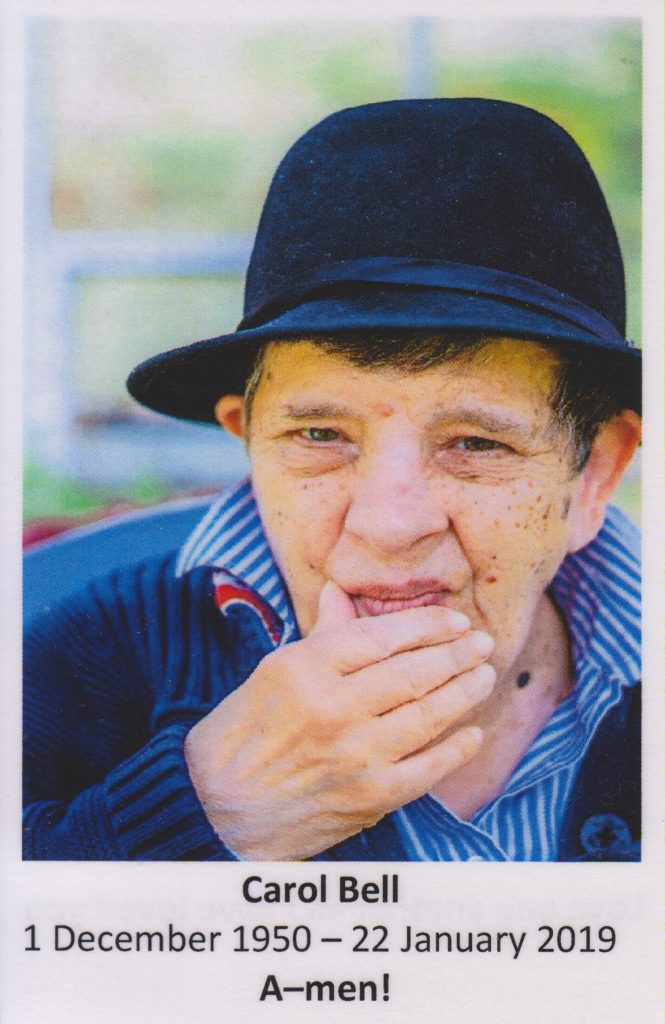
For a short film with extracts of the funeral service, see here:

Pingback: Home – Crossing the bridge into Next
Pingback: The asylums where society sent its “inadequates” |